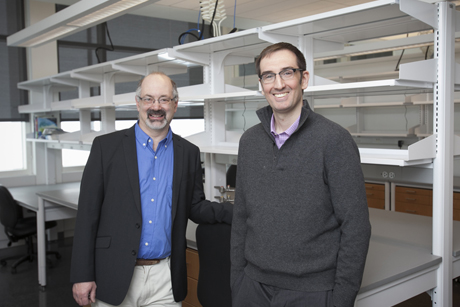Pathogen-testing firm keys into McGovern Center
By Blaine Friedlander

With door keys in hand and research ready for a scientific bench, startup business Ionica Sciences became the newest tenant Feb. 5 at Cornell’s Kevin M. McGovern Family Center for Venture Development in the Life Sciences.
Ionica Sciences produces adaptable, sensitive and easy-to-use biological assays that can detect hard-to-discern infectious diseases, toxins and other biological molecules. The group uses surface-enhanced Raman scattering, known as SERS-based detection to find errant bacteria, viruses, parasites and foodborne pathogens. It can also ascertain human hormones, cytokines, antigens/antibodies, biological fluids and illicit drugs.
SERS-based detecting works like this: Special nanoparticle beads are placed in a biological environment like water or blood samples. These beads are then recovered and tested with a Raman spectrometer laser light; the prompt results indicate whether the disease or pathogen is found.
“For our assay product, all you have to do is mix, filter and read. Those are really the steps involved,” said Joel Tabb, CEO at Ionica Sciences. “Our assays can be handled by police in the field, soldiers, nurses and health care workers. You don’t need to have highly trained technicians.”
On the new McGovern Center space, Omar Green, the chief operating officer said, “This gives us the ability to do our research without worrying about the limitations typically associated with startups. We have access to Cornell facilities like libraries and to a community of like-minded researchers.”
“We’re scientists, and we’d like to gain business experience,” said Tabb. “The McGovern Center has experienced entrepreneurs in residence, and we’re learning that there’s a lot involved in starting up a business. We’ll be joining other entrepreneurs at the McGovern Center, and I’m sure that we’ll learn from them, and others can learn from us.”
Media Contact
Get Cornell news delivered right to your inbox.
Subscribe